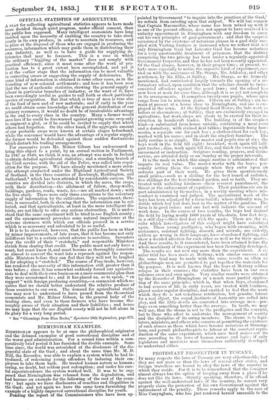BIRMINGHAM EXAMPLES.
Pending the report of the Commissioners who have been ap- pointed by Government "to inquire into the practices of the Gaol,' we refrain from entering upon that subject. We will but remark that Captain Maconochie, whose name has been mixed up with it as one of the peecant officers, does not appear to have received his unlucky appointment in Birmingham with any freedom to carry out his own principles of gaol-government ; and that the surprise occasioned by the existence of notorious abuses in a gaol duly sup- plied with Visiting Justices is increased when we reflect that not only Birmingham Gaol but Leicester Gaol has become notorious for a very questionable treatment of prisoners, that the district comprising the two prisons has been under a regularly-appointed Government Inspector, and that he has not been recently appointed. Of the Gaol abuses, however, in their proper time ; at present, we hate more especially to notice the opposite kind of experiment, cur- ried on with the assistance of Mr. Sturge, Mr. Adderley, and other gentlemen, by Mr. Ellis, at Saltley. Mr. Sturge, as we formerly mentioned, had contributed largely towards the opening of a re- formatory school, upon condition that the scholars should be twice- convicted offenders against the penal laws ; and the school has now been at work for sonic time, although it is as yet not complete in its arrangements. It comprises twenty-one pupils, whose ages range from ten to nineteen years. Fifteen are at Saltley ; six re- main at present at a house close to Birmingham, and one is em- ployed in the town. At the Ryland Road House, the lads work a‘i tailors or shoemakers ; at Saltley, they are exclusively engaged in agriculture, but work-shops are about to be erected for their in- struction in handicraft trades. The building is of the simplest kind—a substantial farm-house outside, containing a meal-room and a dormitory, with stained deal tables; ingeniously-hung ham- mocks, a separate one for each boy ; a clothes-chest for each boy, marked with his name; and in short the simplest furniture. The daily routine is as simple. The master and pupils rise at six ; the boys work in the field till eight ; breakfast, work again till half- past twelve ; dine, work again till five, and finish the evening with amusement or instruction. Scripture reading, prayers, and divine service, are attended daily or on Sunday at the proper intervals.
It is the mode in which this simple routine is administered that imparts its real value. The master works with the boys; per- sonally setting them the example when they enter upon an arduous part of their work. He gives them spontaneously small prizes,—such as a shilling for the best bunch of radishes, five shillings for the best-trimmed garden, and so forth. They amo treated with unfailing kindness—their severest punishment, the threat or the enforcement of expulsion. Their punishments are in part administered by themselves, in a weekly meeting where mis- conduct is examined and judged. The agricultural work of the boys has been adjudged by a farm-bailiff; whose difficulty was, to decide which boy had done best in the matter of the gardens. The farm is in good order; and one fact will indicate the amount of work done. In the course of two months, the boys had drained the field by laying nearly 1600 yards of tile-drain, four feet deep, in a stiff clay—their first feat with the spade. These are the re- sults which investigators of this subject might have calculated upon. These young profligates, who began with swearing, with nicknames, constant fighting, discord, and misrule, are orderly, seldom go wrong in their language, have abandoned fighting, and show a decided affection for each other as well as for their master. And these results, be it remembered, have been attained before the
whole machinery of the experiment has been thoroughly developed. The results are not new any more than the experiment. A si- milar trial has been made at Mettray, with similar success ; and
the same trial may be made with the same results as often as philanthropic men are permitted to put together the materials for the purpose. It is well known that the boys at Mettray seldom relapse in their courses ; the statistics have been in our own columns over and over again. Very similar results were obtained by the Recorder of Birmingham in a much more partial applica-
tion of the same principle; which is, that when boys, abandoned to bad courses of life in early years, are treated with kindness, placed under regular discipline, and enabled to feel that the work
which they do is not vexatious retribution, but genuine labour for a real object, the sound.instincts of humanity are called into play, and the little devils are converted into average men—per- haps even something better than the average. In truth, we may well say, that the shame is not to the profligates and the convicts, but to those who affect to undertake the management of society and the discipline of its erring members. The shame is to legis- lators, ministers, and others who connive at permitting the existence of such abuses as those which have become notorious at Birming- ham, and permit philanthropists to labour at the constant repro- duction of the same experiment, which once tried makes out its case according to the laws of human nature and logic ; if only legislators and ministers were themselves sufficiently developed to understand either.


























 Previous page
Previous page